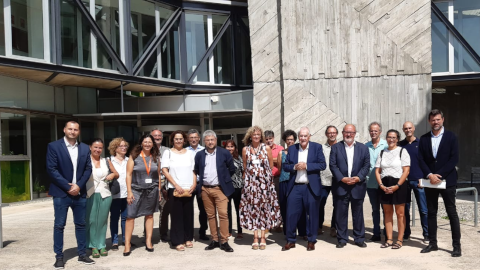Parliament and congress members visit TECNIO centres located at the UAB
Members of the Catalan Parliament and the Spanish Congress of Deputies visited some of the TECNIO Association's centres located on the Universitat Autònoma de Barcelona's campus after having worked closely together on Catalonia's new law on science.

The TECNIO Association emphasises the need to foster knowledge transfer to make return on research investment possible and benefit society thanks to improving the production network
The reform of the Spanish law on science, technology and innovation, passed by the Spanish Congress of Deputies, and the new Catalan law on science, to be voted on soon in the Parliament of Catalonia, both have the objective of fostering innovation through the transfer of knowledge generated by universities and research centres to the business and social sectors.
Catalonia's TECNIO accreditation, conferred by the Government of Catalonia through its agency for business competitiveness, ACCIÓ, is just one of the tools and strategies the country has to acknowledge and motivate researchers in their commitment to transfer knowledge to society. The recently created TECNIO Association aims to defend this strategy as well, and defends the need for more resources and specific policies to be made to foster the transformation of knowledge into wealth and create collaborations between all agents involved in this conversion process: academic institutions (universities and research centres), technology centres, the business sector, and political and governmental institutions and agencies.
At the institutional visit today, members of the Catalan parliament and the Spanish Congress of Deputies were welcomed by UAB Vice Rector for Innovation, Transfer and Entrepreneurship and Director of the UAB Research Park Rosa M. Sebastián, and by representatives of the Board of Directors of the TECNIO Association, presided by ICMAB-CSIC researcher Nora Ventosa. The political delegation was formed by MP Ernest Maragall and MP Engelbert Montalà, as rapporteurs of the law on science in Catalonia, and by Congressman Joan Capdevila, President of the Industry, Commerce and Tourism Commission of the Spanish Parliament and rapporteur of the future law on start-ups.
The investments made in Spain in the 1990s and in Catalonia at the beginning of the year 2000 allowed the country to reach a good level of academic research when compared to other European countries. Now, according to the TECNIO Association, there is the need to increase the amount of knowledge transfer in order to make return on investment possible and make it beneficial for people and society. Of the nearly 1,700 AGUAR consolidated research groups, belonging to different Catalan universities and CERCA and CSIC centres, only 60 have received the TECNIO seal. According to the association, this data is a clear indicator of the need to stimulate knowledge transfer through tools such as the TECNIO model, and guarantee return on research investment and benefits for society thanks to improving the production network.
Eight TECNIO groups located on the UAB campus
The delegates visited three of the eight TECNIO centres located at the UAB centre: the Viral Vector Production Unit (UPV), a joint UAB and Vall d’Hebron Research Institute (VHIR) unit dedicated to the design and production of viral vectors for gene therapy research; the Computer Vision Centre (CVC), dedicated to research in computer vision and the development of artificial vision systems to improve people's everyday life, and the NANOMOL group, from the Institute of Materials Science of Barcelona (ICMAB-CSIC), which is dedicated to developing new molecular nanomaterials for advanced therapies and new electronic devices. Finally, the delegates were invited to visit the UAB Research Park (PRUAB), home to several university spin-offs, where they attended a presentation of both the TECNIO accreditation and association.
TECNIO Association's centres
The 60 groups awarded TECNIO accreditation are technology developers accredited by AGAUR conducting applied research in differential technologies with the capacity of transferring results to the market through R&D projects with businesses, patent licenses or tech-based startups. These research groups specialise in different areas, most form part of Catalonia's universities, and are located in different parts of the country, working closely with small- and medium-sized companies as well as with large companies located in Catalonia and Europe.
In 2021, all universities in Catalonia, the I-CERCA Foundation and the CSIC created the TECNIO Association with the aim of bringing together and raising awareness of the activities conducted by the research groups with a TECNIO seal, as well as fostering their collaborations and offering them as a point of union with business and administrative sectors, thereby accelerating the transfer of knowledge from research laboratories to society.